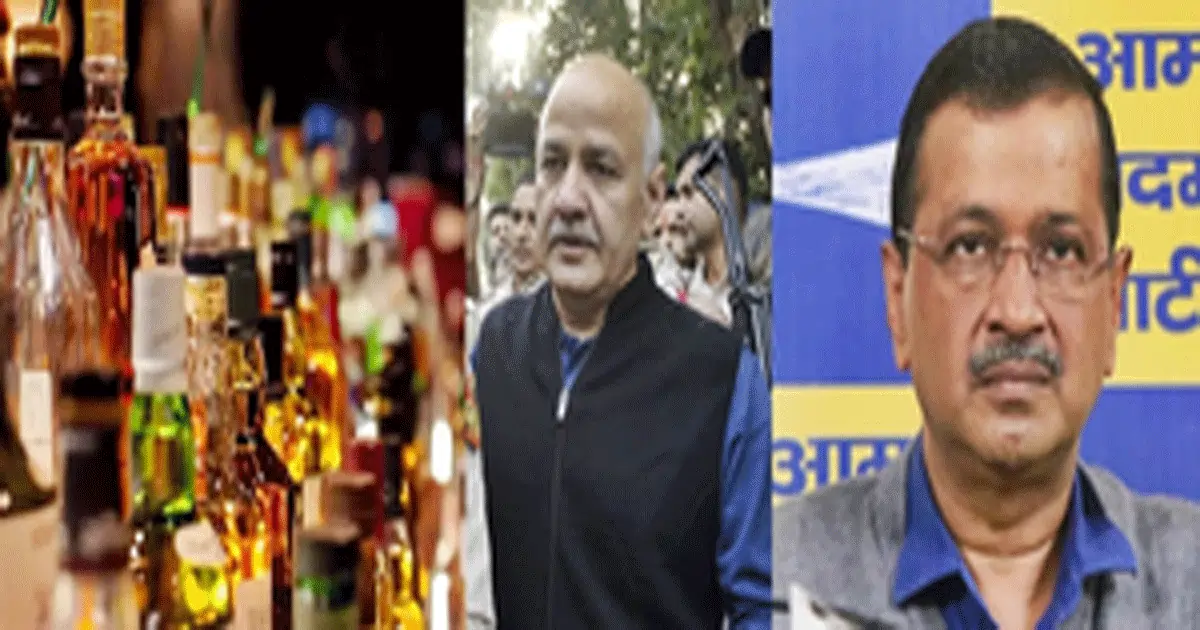National News
Delhi Liquorgate: CAG report shows Rs 2,002 cr loss, non-achievement of objectives

New Delhi, Feb 25: The Comptroller and Auditor General of India (CAG) report tabled in Delhi Assembly on Tuesday said that former Chief Minister Arvind Kejriwal and his ministers allegedly caused a loss of over Rs 2,002 crore through their non-transparent excise policy, popularly known as “Liquorgate”.
Pointing to illegal decision-making to benefit some favoured licencees, the damning report said, “Actual implementation was sub-optimal and objectives behind the policy were not achieved. Vends in non-conforming wards could not be opened and equitable distribution of retail vends could not be achieved. Issue and management of zonal licences had major shortcomings.”
The document of the Central government’s auditor that has exposed the liquor scam is named, ‘Report of the Comptroller and Auditor General of India on Performance Audit on Regulation and Supply of Liquor in Delhi.’
The scam related to the now-scrapped excise policy was a key issue in the just-concluded Assembly Elections, with even Prime Minister Narendra Modi promising to expose the corrupt by announcing, “Jinhone loota hai, unhe lautana padega (The looters will have to pay back every penny).”
On Tuesday, the CAG report was table by Chief Minister Rekha Gupta amid thumping of desks by BJP legislators even as Lieutenant Governor V.K. Saxena promised to study the CAG findings and improve the system.
Earlier, corruption and money-laundering cases related to the now-withdrawn excise policy saw Kejriwal and his Cabinet colleagues – Manish Sisodia and Satyendar Jain – spend months behind bars, before getting bail from court.
The findings of the Comptroller and Auditor General of India, Girish Chandra Murmu also highlight the areas in which it failed to achieve its stated purposes.
These failed objectives included: Generate optimum revenue for government, eradicate sale of spurious liquor, simplify excise regime, counter formation of cartels, simplify duty and pricing policy and adequate spread of retail vends.
“Responsibility and accountability should be fixed for the lapses observed and the enforcement mechanism should be strengthened,” said Murmu in his final recommendation in the report for the year ended March 31, 2022. The report was also signed by Principal Accountant General (Audit), Delhi, Aman Deep Chatha.
Under the head of “Decisions taken without the approval of competent authority”, the CAG report included opening of liquor vends in conforming areas like residential areas or close to places of worship or schools.
The report also slammed the previous government for relaxation regarding coercive action against the licencees in case of default of payment of fee, waiver or reduction in licence fee, refund of earnest money deposit in case of Airport Zone and correction in formulae for calculating MRP in case of foreign liquor.
The CAG report also underlined the fact that a report of group of AAP ministers deviated from the recommendations by an expert committee for drafting a new excise policy.
One of the glaring lapses by the GoM was allowing one applicant to get allotment of up to 54 retail vends as compared to the expert panel’s suggestion that an individual may be allotted a maximum of two vends.
The CAG also flagged the provision in the now-scrapped excise policy to allow retail licencees to offer discounts to customers.
Another key finding was the non-setting up of labs to check the quality of liquor being supplied in Delhi, a lapse that exposed millions of city residents to health risks, said the CAG report.
The government auditor’s report tore into the AAP government’s policy-making and implementation, citing several instances of irregularities like – lack of transparency in pricing, violation in issue and renewal of licences, non-penalisation of violators, non-seeking of approval from LG, Cabinet or the Assembly.
The CAG report said the exchequer lost around Rs 890 crore as the AAP government did not re-tender the surrendered retail liquor licences.
The report noted, “There was lack of scrutiny of the business entities with regards to their financial wherewithal and management expertise. Instances of related business entities holding licenses across the liquor supply chain were noticed.”
“Liquor supply data indicates exclusivity arrangements between zonal licencees and wholesalers and Brand Pushing. Surrender of zonal licences during the extended policy period further led to substantial revenue loss. Other important measures which were planned in the policy, like setting up of laboratories and batch testing for quality assurance, setting up of super premium vends etc., were not implemented,” it said.
The government lost an additional Rs 941 crore due to the exemptions that had to be given to the zonal licencees, the report said.
The GoM, headed by Minister Manish Sisodia, allegedly did not act on the recommendation of the expert panel and even allowed disqualified entities to bid for licences.
National News
Housing fraud case: Ajit Pawar accepts NCP minister Manikrao Kokate’s resignation, forwards it to CM

Mumbai, Dec 18: Amid a chorus from the opposition, Maharashtra Deputy Chief Minister and NCP chief Ajit Pawar on Thursday accepted the resignation of party minister Manikrao Kokate, against whom an arrest warrant has been issued in a housing fraud case.
Kokate had submitted his resignation to DCM Pawar on Wednesday after a sessions court sentenced him to two years’ imprisonment in the Nashik housing fraud case.
On Wednesday night, Kokate was stripped of his Sports and Minority Affairs portfolios and was retained as a minister without any portfolio.
Kokate is currently undergoing medical examination at Lilavati Hospital after he complained of uneasiness. He has already approached the Bombay High Court seeking relief from the sessions court ruling.
In a post on X, Ajit Pawar said: “Maharashtra Cabinet Minister and my party colleague Shri Manikrao Kokate has submitted his resignation to me following the outcome of the Hon’ble Court’s verdict. In keeping with our party’s long-standing philosophy that the rule of law is supreme and above all individuals, the resignation has been accepted in principle. I have forwarded Shri Kokate’s resignation to the Hon’ble Chief Minister for due consideration and acceptance, in accordance with constitutional procedure.”
He further stated: “Our party has always believed that public life must be guided by constitutional morality, institutional integrity and respect for the judiciary. We stand firmly by the rule of law and will continue to act in a manner that upholds democratic values and public trust.”
Pawar took the decision after holding a meeting lasting over two-and-a-half hours early Thursday morning with party working president Praful Patel and state chief Sunil Tatkare.
Manikrao Kokate is a five-time MLA from the Sinnar constituency in Nashik district and has a history of shifting political loyalties. His membership of the legislature could also be at risk if the High Court upholds the sessions court ruling.
The sessions court upheld his conviction in a case involving the illegal acquisition of government flats through forged documents and sentenced him to two years of imprisonment. Following the verdict, an arrest warrant was issued against Kokate.
He faces imminent arrest unless the High Court grants a stay on the conviction.
Amid these legal developments, Kokate’s health condition deteriorated and he was admitted to Lilavati Hospital in Mumbai. He skipped the weekly cabinet meeting held on Wednesday at Mantralaya.
Kokate’s legal team informed the court that he was admitted to a hospital and sought a four-day stay on the arrest. However, the court rejected the plea, noting that no medical certificate was presented and that Kokate should have been present when the verdict was delivered.
Kokate has moved the Mumbai High Court challenging the sessions court ruling and has sought an urgent hearing and a stay on the sentence.
The High Court is scheduled to hear the matter on Friday.
The case dates back to 1995 and involves the alleged misappropriation of flats reserved under the Chief Minister’s quota. These flats are meant for low-income individuals who do not own property elsewhere.
Manikrao Kokate and his brother Vijay Kokate were accused of submitting fraudulent affidavits and documents to acquire two flats in the Nirman View Apartment in Nashik.
Investigations later revealed that the brothers were also using two additional flats in the same building that had been allotted to other beneficiaries.
Based on an inquiry conducted by the district administration, Vishwanath Patil, then an official of the Urban Land Ceiling (ULC) department, filed a complaint. Subsequently, a fraud case was registered at Sarkarwada Police Station against four individuals, including the Kokate brothers.
The court sentenced them to two years of rigorous imprisonment and imposed a fine of Rs 50,000 each.
Since his induction into the cabinet, Kokate has been embroiled in several controversies.
He was stripped of the Agriculture portfolio after the monsoon session of the state legislature in July, following allegations by NCP-SP legislator Rohit Pawar that Kokate was playing games on his mobile phone during a Legislative Council session. While Kokate denied the allegation, it drew widespread criticism.
He also triggered outrage with controversial remarks on farmers, stating: “Even a beggar does not accept one rupee, but here we provide crop insurance for just one rupee, yet some people try to take undue advantage of it.”
During a municipal election campaign, Kokate had also taken a swipe at coalition partner BJP, calling it a “corrupt party” (batlela paksha) that survives by breaking other parties while sidelining its own workers.
Earlier this year, another NCP minister, Dhananjay Munde, had resigned after his aide Walmik Karad was linked to the murder of Santosh Deshmukh, sarpanch of Massajog village in Beed district.
Mumbai Press Exclusive News
2 MD vendors in Mumbai sentenced to 20 years, accused sentenced due to improvement in police investigation in ANC case

The Mumbai Anti-Narcotics Cell had arrested two drug peddlers in 2017 and recovered drugs from their possession and now the court has sentenced these drug peddlers to 20 years in prison and a fine of Rs 1 lakh. Drug peddlers Praveen Dilip Vaghela and Ramdas Pandurang were arrested by ANC’s Ghatkopar and the MD’s car was also seized during the search of the accused.
Crime
Navi Mumbai Police Seize Drugs Worth Rs 21 Lakh, Nigerian National Arrested

The Navi Mumbai Police have seized drugs worth over Rs 21 lakh, including mephedrone and MDMA, and arrested a Nigerian national in connection with the case, officials said on Wednesday.
The seizure followed a routine police patrol carried out on December 15 along Palm Beach Road. A team noticed a foreign national standing suspiciously near a parked scooter late at night. When the police approached him for questioning, the man abandoned the vehicle and fled the spot, raising further suspicion.
Upon checking the scooter, the police recovered 70 grams of mephedrone powder, estimated to be worth nearly Rs 17 lakh. In addition, 120 MDMA tablets were also found during the initial search, an official release stated.
Following the recovery, police launched a search operation to trace the suspect. He was later arrested from his residence in Koparkhairane. During a subsequent search of the premises, police recovered additional quantities of drugs, including mephedrone powder worth around Rs 4 lakh and 40 purple MDMA tablets.
While the combined value of the seized mephedrone powder has been estimated at over Rs 21 lakh, the police did not specify the market value of the MDMA tablets recovered during the operation.
The accused has been identified as Aniehe Kingsley Chinedu, also known as Aney Kingsley Chinedu. He is a Nigerian national and has been booked under relevant sections of the Narcotic Drugs and Psychotropic Substances Act.
Police officials said further investigations are underway to determine the source of the drugs and to identify possible links to a larger drug supply network operating in the region. Authorities are also examining whether the accused was involved in drug distribution across Navi Mumbai and neighbouring areas.
The Navi Mumbai Police said such operations would continue as part of ongoing efforts to curb drug trafficking and ensure public safety.
-

 Crime3 years ago
Crime3 years agoClass 10 student jumps to death in Jaipur
-

 Maharashtra1 year ago
Maharashtra1 year agoMumbai Local Train Update: Central Railway’s New Timetable Comes Into Effect; Check Full List Of Revised Timings & Stations
-

 Maharashtra1 year ago
Maharashtra1 year agoMumbai To Go Toll-Free Tonight! Maharashtra Govt Announces Complete Toll Waiver For Light Motor Vehicles At All 5 Entry Points Of City
-

 Maharashtra1 year ago
Maharashtra1 year agoFalse photo of Imtiaz Jaleel’s rally, exposing the fooling conspiracy
-

 National News1 year ago
National News1 year agoMinistry of Railways rolls out Special Drive 4.0 with focus on digitisation, cleanliness, inclusiveness and grievance redressal
-

 Maharashtra1 year ago
Maharashtra1 year agoMaharashtra Elections 2024: Mumbai Metro & BEST Services Extended Till Midnight On Voting Day
-

 National News1 year ago
National News1 year agoJ&K: 4 Jawans Killed, 28 Injured After Bus Carrying BSF Personnel For Poll Duty Falls Into Gorge In Budgam; Terrifying Visuals Surface
-

 Crime1 year ago
Crime1 year agoBaba Siddique Murder: Mumbai Police Unable To Get Lawrence Bishnoi Custody Due To Home Ministry Order, Says Report












